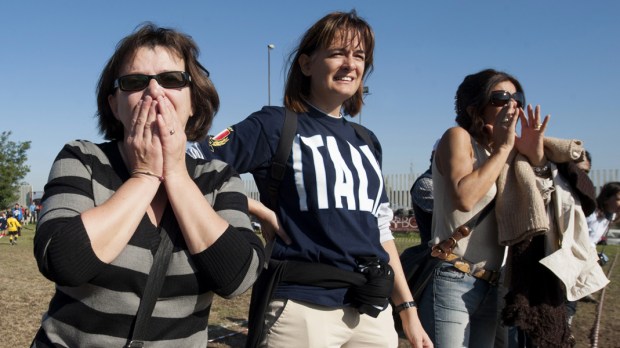Lenten Campaign 2025
This content is free of charge, as are all our articles.
Support us with a donation that is tax-deductible and enable us to continue to reach millions of readers.
Phil Baniewicz, the president of our daughter’s high school, calls parents into an assembly every year to discuss an awkward subject: bad behavior.
Not students’ behavior at school – parents’ behavior at sporting events.
Baniewicz, a co-founder of Life Teen, is also the school’s baseball coach and the father of teens, so he knows what he’s talking about. He has worked with Notre Dame’s high school program Play Like a Champion for years. He shared some behavior rules for parents.
Thou shalt not scream at referees.
Baniewicz pointed out that Kansas is facing a referee shortage. A quick Google search shows that we are not alone:
- In Texas: “officials shortage reaching crisis levels.”
- “Shortage of high school officials becoming a ‘crisis’ in Oregon.”
- A national high school association says the shortage has reached “epic proportions.”
Why? “How would you like to go to your job every day and a crowd constantly follows you and screams how terrible you are every time you make a decision?” Baniewicz asked. “I don’t think many of us could last very long.”
Research shows that the behavior isn’t any better at Catholic campuses, he said. It’s often worse.
Baniewicz suggested spending some time at a game watching the parents instead of the field. It’s eye-opening and embarrassing to watch parents viciously attack people who are only trying to facilitate their children’s fun.
“I have learned as a coach and administrator to take care of the officials, get to know them, and go out of your way to do something nice for them,” he said. “They don’t mind if I ask for clarification on a call or disagree with their decision.”
Thou shalt not pester the coach.
Alabama media polled coaches in the state and found that the pressure high school coaches are under from parents is immense:
- 63 percent of coaches in the survey have considered quitting because of parents.
- 60 percent say parents have gotten worse over the course of their careers.
- 89 percent say booster groups have threatened to withhold donations to punish coaches.
They get pressured about kids’ playing time, and also about their basic competency. Parents are very willing to tell the coaches that they know how to do the coach’s job better than the coach.
Coaches, for their part, offered some critiques of how parents are doing their job:
- “Many parents don’t want their kids coached, they want them pampered.”
- “Parents often have unrealistic assessments of their children’s skill level.”
- “Some parents think that whatever they say on social media is off limits.”
But one stat from the survey should help quiet parents: Only 1 in 5 coaches said they ever made a change suggested by a parent.
As with refs, Baniewicz said, Christian love is always a better way.
“When a parent says an encouraging word, or offers to help a coach — expecting no favors in return — it is a positive shot in the arm,” he said. “Many of us who coach in Catholic schools are truly coaching because we love the sport and want to help students grow closer to the Lord.”
Thou shalt honor all your child’s gifts.
Parents’ rabid fan behavior sends a clear message to kids: Sports is the most important thing in life.
Think about it. They never hear us care so much about something that we shout in public — except in stadiums. And we are rarely as passionately protective of their other gifts as we are of their athletic ability.
Peoria priest Father Chase Hilgenbrinck, a former professional soccer player, worries about that.
“Sports were meant to be what we do … to form family, to form fraternity, to form friendship, to have leisure on the Lord’s Day. And what has happened? We put sports above all things. Our stadiums have become the new cathedrals,” he told Sports Leader.
“Sports demand everything,” he said. “They demand all of our time, all of our attention, every effort that we have. … Yet isn’t that what Jesus Christ taught us about his life? That our faith should demand all of our attention, of our effort, all our mind, body and soul? Everything that we do should be devoted to him.”
Baniewicz offered some advice: Promote virtue, not just victory. Praise efforts made while losing. Offer more positive feedback and less negative.
“Realize that sports are just part of the equation of who your child is,” he said.
The people we need to evangelize are watching us, he said. “I hope that by the way our coaches, players, and parents act they can see Christ shining through us.”

